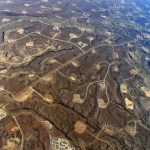hydraulic fracturing
Research makes it increasingly clear that along with drilling for oil and mining coal, extracting natural gas from deep underground causes serious damage to the environment and to public health. On The Pump Handle, Kim Krisberg examines the contamination that may result from dumping fracking wastewater into disposal wells, writing "about 1,000 different chemicals are used in the fracking industry, with more than 100 being known or suspected endocrine disruptors." Researchers collected water samples downstream from wells in West Virginia, and after "exposing both female and male mammalian sex…
For some time now, proponents of the controversial practice of hydraulic fracturing or “fracking” have claimed there was little or no evidence of real risk to groundwater. But as the classic saying goes: “the absence of evidence is not evidence of absence” of a problem. And the evidence that fracking can contaminate groundwater and drinking water wells is growing stronger with every new study.
As most people now know, fracking is a method for enhancing the production of natural gas (or oil, or geothermal energy wells). Fracking involves injecting fluids -- typically complex mixes of water and…
by Elizabeth Grossman
Tap water bursting into flame, water sources contaminated with toxic chemicals, once-pastoral rural hillsides turned over to industrial fossil fuel extraction, and unprecedented earthquake activity. These are among the environmental health concerns commonly associated with the extraction of natural gas by the method known as hydraulic fracturing – or fracking. But one of the more pernicious and pervasive potential occupational fracking hazards may come from sand. Not just ordinary sand, but sand that is nearly 100% crystalline silica and specially produced to play a key…
